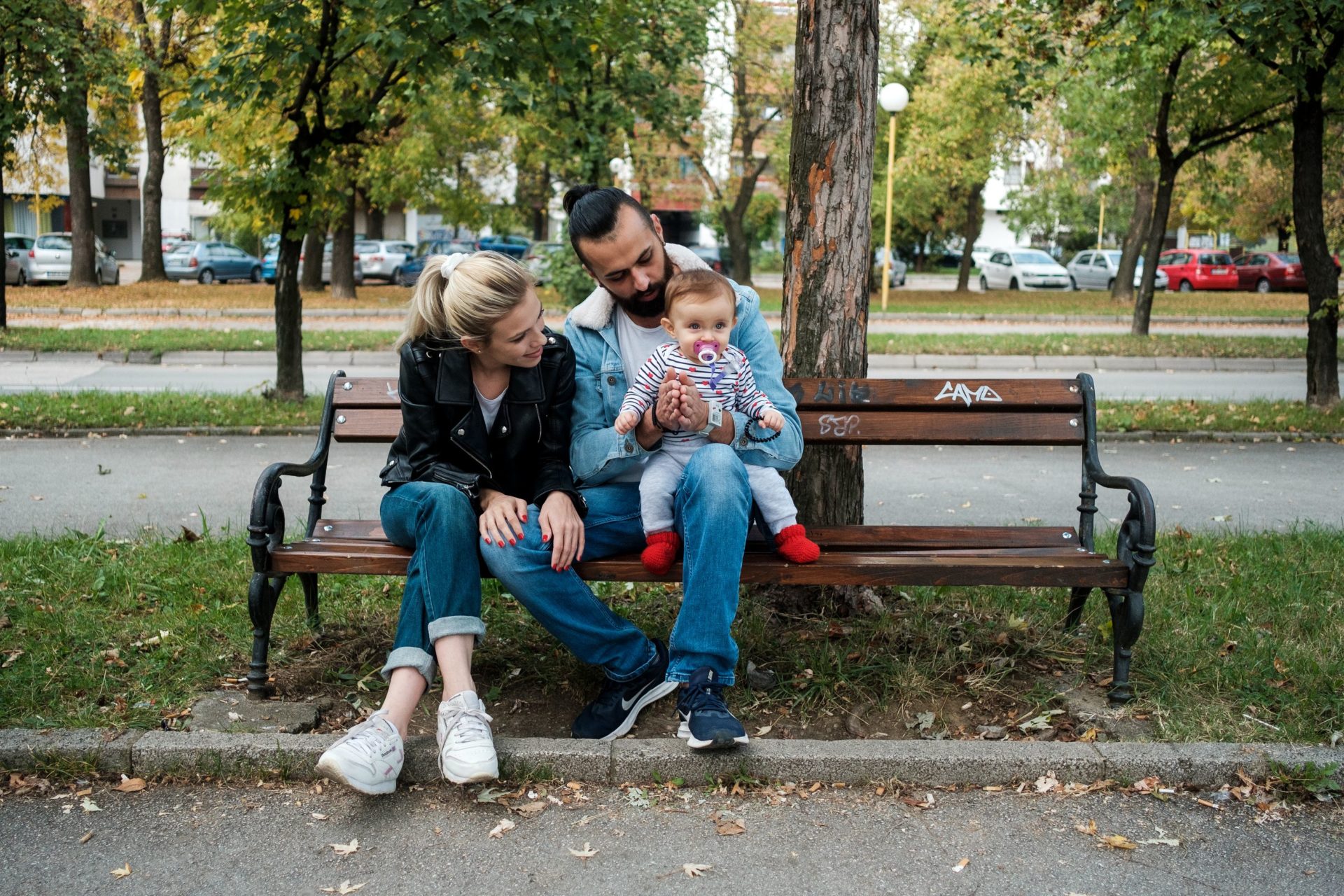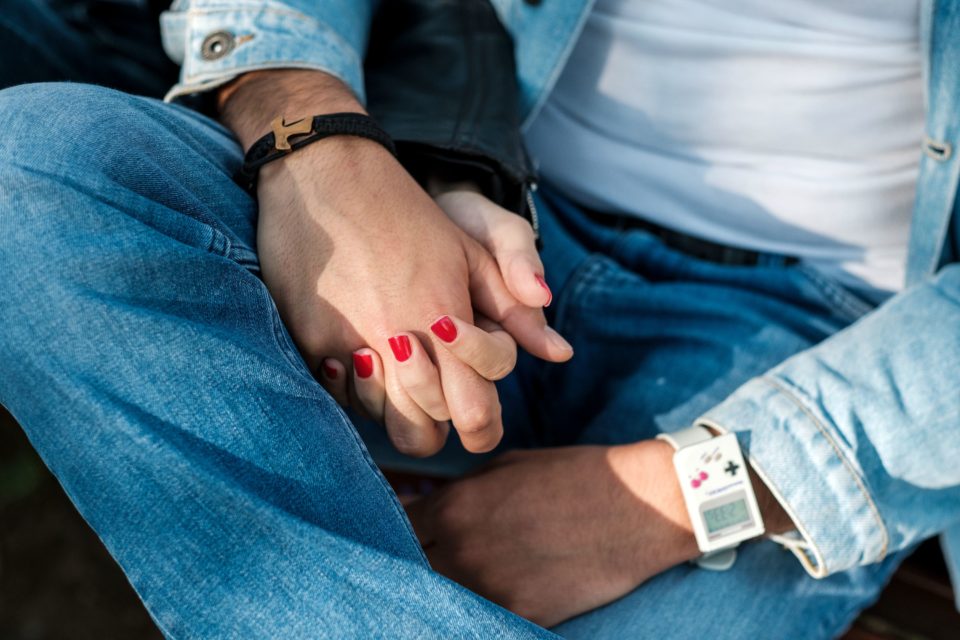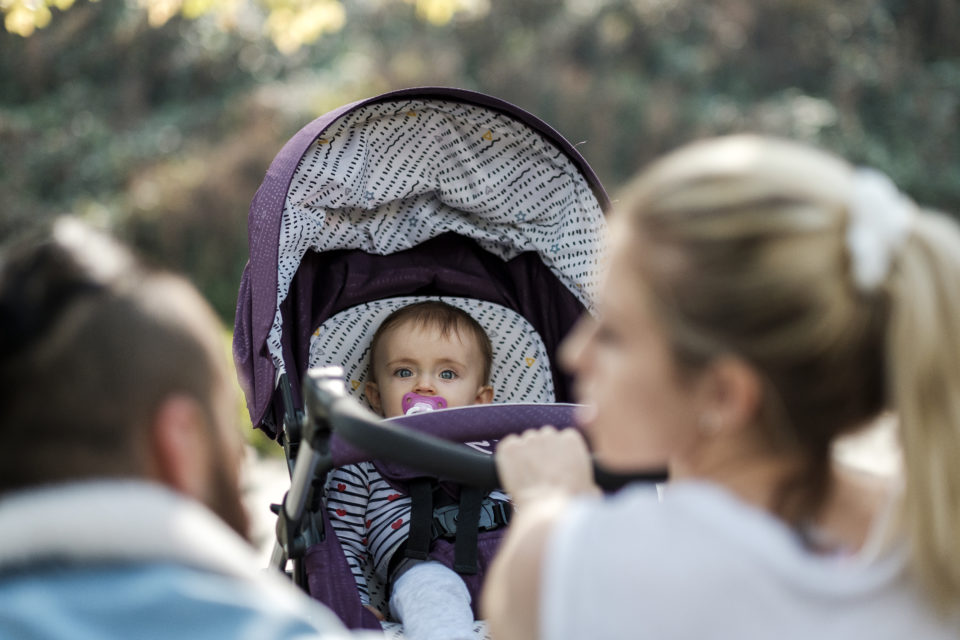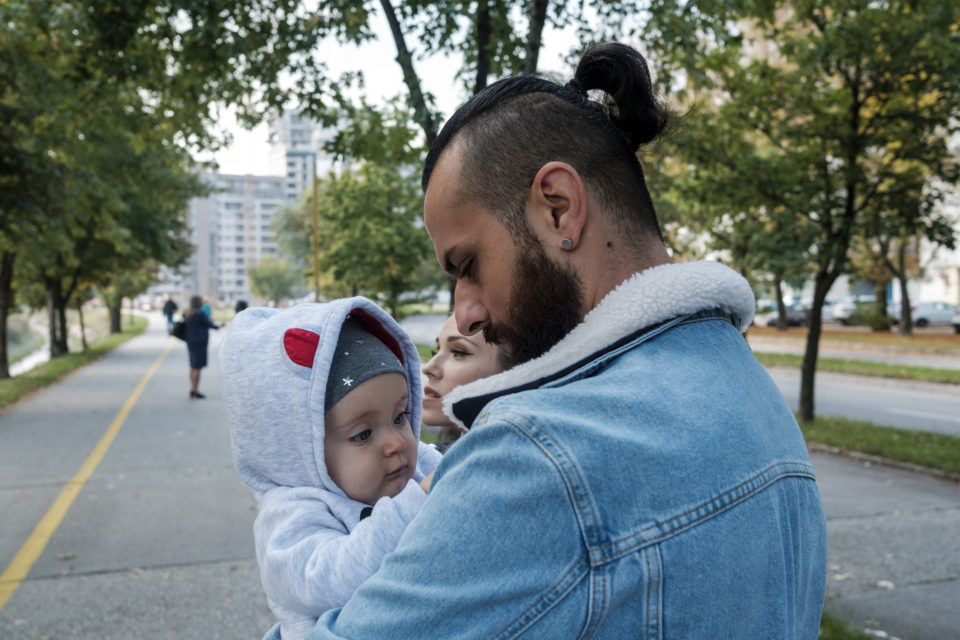
Jasmina Alić-Zec and Siniša Zec met through Facebook. By the end of their first coffee date, which lasted for five or six hours, they realized they have a lot in common, from their clothing style to the kind of music they listen to and their love for nature. Although society defines them as Bosniak and Croat, they don’t identify that way. Their different ethnic backgrounds did not stand in the way of their love story, which culminated with their marriage in Tuzla, where they now live with their daughter Iris.
Siniša’s first message to Jasmina was “Hello.” Jasmina, having already heard from a relative how kind and wonderful he was, replied. They arrived at their first date dressed almost identically. “Both of us wore red converse sneakers and jeans,” recalled Jasmina, emphasizing how much she and Siniša have in common, including their likes and dislikes.
One of the things they share is a love for nature, and Jasmina describes how they can spend all day or night outdoors, talking about nature, or looking at photos. This is why they use almost every weekend to connect with nature.

“When certain things click, there’s not much more to think about,” said Siniša, describing his love with Jasmina, who he characterizes as an amazing and emotionally sensitive young women who is very caring and requires little to be happy.
Describing her husband, Jasmina says that he’s not a typical “Balkan man” in terms of his mentality. He is very dedicated and hardworking, and at the same time very intimate and close to his family. “At first, he seems rough, macho, but he’s so kind—a great parent. He changes diapers, bathes the baby, and she’s a real daddy’s girl,” Jasmina remarks.
Jasmina was born in Tuzla and earned her degree in technology, while Siniša was born in Sarajevo and works in graphic design. When they met, they didn’t care about their ethnic differences because they had both been raised in families where they were taught that the only thing that matters is whether or not a person is good.
Jasmina quoted her parents: “If it’s good for you and if it’s your choice and if it’s what you need, want, go ahead. It doesn’t matter whether someone is a Muslim, a Serb, a Catholic, a Bosniak, a foreigner, whatever they are, as long as they’re a good person.”
When their daughter was born and they applied for her birth certificate, they were completely taken aback by the clerk’s question: “And how does the baby declare itself?”
“We Don’t Care Who You Are”
Jasmina and Siniša live in Tuzla, where, as she describes, multi-ethnic couples are viewed a little differently. “We’re used to it, my group friend consists of Darija, Vlasta, Nikolina, Jadranka, Ljubica, Marin, and Tea. We don’t care who you are, and I have a lot of friends from mixed marriages because it’s totally irrelevant to people,” said Jasmina.

Jasmina finds it fascinating that young people who are born in 2000 are arguing about the war on Facebook, and in her opinion, this shows that they had to learn this behavior at home.
“It’s simply not a topic for us. We celebrate Easter, Christmas, and Eid. It’s more of an occasion for us all to get together and have a good time,” Jasmina continued.
When asked about the effect of politics on the perception of multi-ethnic relationships and marriages, Jasmina replied that it’s not in politicians’ interests to promote diversity and the things that unite people, culturally and in every other sense. She believes that it’s more convenient for them if people are divided rather than caring towards each other or inclined to help and take care of one another. The more people are cut off from each other, the more alienated they are from one another, the better off the politicians are.
“Every time you don’t know what to do, what kind of economic plan or socioeconomic reform to implement, how to save the economy or improve health care, then you just have to start talking about the secession of the RS (Republika Srpska), joining Serbia, or possibly Herceg-Bosnia. And then there’s the SDA (Democratic Action Party), they’ll say that they’re the pillar of the state, they’re building Bosnia, the Federation… Sabers start rattling. So many years after the war, the themes of the war come right back. And we’re all toiling to earn minimum wage,” explains Jasmina.
Siniša doesn’t think that things will ever get better in Bosnia and Herzegovina: “When you look through history, there’s never been good times, that’s the kind of people we are.”
“How much our salaries are, how, for example, diapers are more expensive in Bosnia than in Germany…these are things that bother me more than the ethnic, national, religious context,” added Jasmina.
They celebrate every holiday and never miss out on any delicious cuisine. “For Easter, we were all at our house, for Christmas at my mother-in-law’s, and for Eid we visit all my relatives, we go to my mother, my grandmother, my aunts. Sometimes we meet with our best man and his family, or they visit us for Eid. We’re all together and we love it,” said Jasmina.
They plan to explain multiethnic identity to their child, just like their parents explained the concept to them.
“It should be said spontaneously and naturally, children learn from what their parents say,” said Siniša. Jasmina agreed: “That’s right, if you don’t swear, you’re cultured, polite, surely your child won’t be any different either. If you teach your child to be good, not to beat other children, not to be violent, that it’s nice to share, your child will share…and the same goes for everything else. It’s important that you teach your child that the important thing is that someone is a good person, that they are comfortable with that person. They’ll be guided by an appreciation for good people, and not to classify someone by what’s written on their [ethnic] declaration or judge by that.”
Jasmina states that they’ve only felt the segregation in society when they were asked questions like “What will your child’s name be?” or “If it’s a boy, will he be circumcised?”
Everyday Life Dedicated to Our Daughter
“From when we wake up, the baby’s eyes are this big,” says Siniša, gesturing with his hands. “She’s in bed with us, she pulls our hair, our noses. We wake up, I cuddle with the baby, I cuddle with Jasmina. Then I change the diaper, the morning diaper change is my job. Then I go to work, I get at least 15 pictures to see what the baby is doing, is she nervous, is the baby talking, is she doing anything new. I come home, cuddle with the baby again, go outside for a walk, visit both grandmas. In the evening, we bathe her, we watch a show, the baby sleeps,” he continues, describing an ordinary day for the Zec family.
When Siniša isn’t working, they go to the mountains and usually spend the day in a cottage. “The baby was in the forest for the first time at 22 days old, we broke the 40-day rule about not going out,” said Siniša.

Everyone warned Jasmina that she wouldn’t even have time to watch television because of the child. “People generally have problems because they don’t share responsibilities,” said Siniša. “When the baby falls asleep at night, we watch a series, drink tea. A completely ordinary and cool day, where we have time for each other and for the baby… it’s nice and fulfilling,” Jasmina confirmed.
The Secret to a Good Marriage
Jasmina asserts that the most important thing in a relationship is to be best friends, to have good communication and to be with someone you can trust. Siniša highlights trust as the most important element of a relationship.
Jasmina also emphasizes the importance of respect, willingness to accept someone with all their virtues and flaws, and the ability to compromise. For her, the meaning of love is to warm your heart. Pointing to their little daughter, Siniša responded, “Here’s the meaning.” Jasmina continued that love is “having a reason to get up in the morning, having a reason to strive to be a better person.”
It’s important for them that their child is hardworking, diligent, and curious, and that when they tell her something, she doesn’t just take it for granted. They want her to investigate, doubt, not simply accept other people’s narratives but live for her own goals, to be educated and literate. They point to illiteracy and a lack of critical thinking as major problems today. As Jasmina noted, she doesn’t want her child to be burdened by the opinions in her environment.
“If some people are from the city but live in a closed-minded environment, pack your bags and get as far away as you can. You can’t set a crooked river straight,” Siniša concluded. “True,” added Jasmina, “but you can encourage yourself not to be affected by what those around you think.”
This story is part of the “Love Tales” project implemented by the Post-Conflict Research Center (PCRC) with a group of Balkan Diskurs youth correspondents. The project is implemented with financial support from the VII Academy, the BOLD program of the US Embassy in BiH, and PCRC’s core grants, with the aim of challenging the common narrative that real connections between Bosnia’s different ethnic groups are unattainable by documenting stories of successful interethnic relationships across the country.





